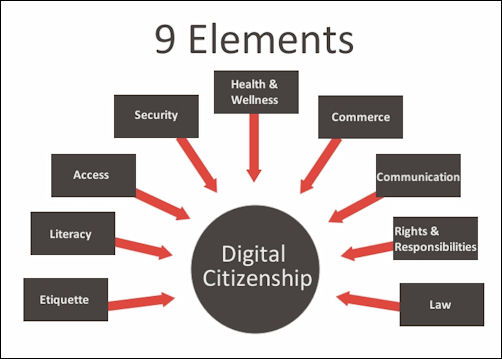Overview:
![]() This module has two parts - this first section on digital citizenship, and a second part on Acceptable Use Policies and Internet filtering in your school.
This module has two parts - this first section on digital citizenship, and a second part on Acceptable Use Policies and Internet filtering in your school.
You use technology on a daily basis-email, surfing the 'net, instant messaging, watching videos, networking. You live in two worlds: the so-called “real” and “digital” worlds.
Do decisions made in your digital world affect you as much as those made in the real world? The answer is a loud Yes; in fact, your digital decisions and behaviors can affect you more and for longer than decisions made in the real world-especially with your current and even with prospective employers. Your digital footprint has a long lasting effect on your life.
In today’s world, it is important for you to not only learn to be a good citizen, but to be a good digital citizen! So, what does all this mean? Digital Citizenship can be defined as 'appropriate, responsible behavior with regard to technology use.'
Themes:
 In an article Mark Ribble (2009) describes nine categories around how we should be thinking about our use of technology both as a student and as an adult:
In an article Mark Ribble (2009) describes nine categories around how we should be thinking about our use of technology both as a student and as an adult:
1. Digital Etiquette: electronic standards of conduct or procedure.
2. Digital Communication: electronic exchange of information.
3. Digital Literacy: process of teaching and learning about technology and the use of technology.
4. Digital Access: full electronic participation in society.
5. Digital Commerce: electronic buying and selling of goods.
6. Digital Law: electronic responsibility for actions and deeds
7. Digital Rights & Responsibilities: those freedoms extended to everyone in a digital world.
8. Digital Health & Wellness: physical and psychological well-being in a digital technology world.
9. Digital Security (self-protection): electronic precautions to guarantee safety.
Activities:
First, read more about the nine elements here.
Then, pick any two elements that stand out in your mind as a problem you think needs to be addressed more in your school. Next, do some research on that problem, and in the Digital Citizenship Response forum, detail the issues, links to possible solutions, and your own proposed solution to help mitigate those issues.
Once done, proceed to the next forum response on When Adult's Are The Bullies and then to the section on AUP's and filtering.
References:
Luppicini, R., & Adell, R. (2009). Handbook of research on technoethics . Hershey, PA: Information Science Reference.